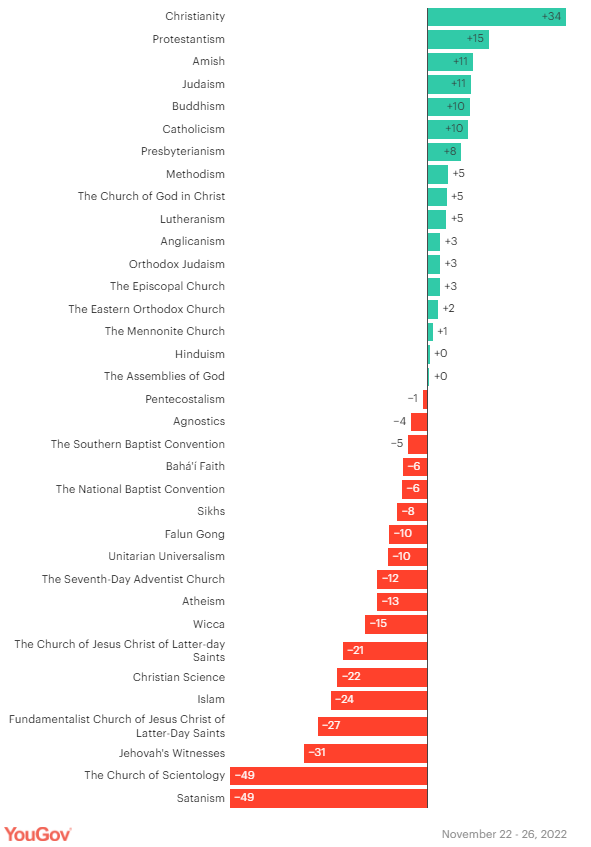A recent YouGov poll explores Americans' attitudes toward 35 religious groups, organizations, and belief systems. Belief systems that encompass the largest shares of Americans — including Christianity, Catholicism, and Protestantism — are among the ones the most Americans view favorably. Viewed least favorably are Satanism and Scientology.
The poll asked 1,000 respondents whether they viewed a random sample of 17 of the 35 religions or groups very favorably, somewhat favorably, neither favorably nor unfavorably, somewhat unfavorably, or very unfavorably; respondents also could select "not sure" instead of any of these. To produce a net score for each religion or group, we subtracted the share who said they view each one unfavorably from the share who said they view it favorably.
Using this metric, Christianity is by far the most highly favored belief system, receiving a net score of +34. Protestantism, the next most popular, falls 19 points behind Christianity at +15. Just a few points behind Protestantism is the Amish (+11), Judaism (+11), Buddhism (+10), and Catholicism (+10). (This method tends to give higher positive or negative scores to things that are more widely known, since people who are unsure or have neither a favorable or unfavorable opinion don't count either way toward net scores; that accounts for some of Christianity's big lead over the rest.)
Which religions are viewed least favorably? Tied for last place are Satanism (-49) and the Church of Scientology (-49). Other groups that receive net negative ratings are Jehovah's Witnesses (-31), the Fundamentalist Church of Jesus Christ of Latter-Day Saints (-27), Islam (-24), Christian Science (-22), and the Church of Jesus Christ of Latter-day Saints (-21). Belief systems that are viewed favorably and unfavorably by a roughly equal share of Americans include Pentecostalism, the Assemblies of God, Hinduism, and the Mennonite Church.
Looking at the full results reveals a more detailed picture of which religious groups and belief systems Americans are familiar with, as well as how strongly they feel about them. The least well-known are Falun Gong (a spiritual movement that originated in China in the 1990s), the Bahá'í Faith (a religion that originated in the Middle East in the 19th century), and Sikhism (a religion that originated in India in the 15th century).
Roughly half of Americans identify as Protestants of various denominations. We find quite little variation in Americans' views of specific Protestant denominations, with most being viewed favorably by between 20% and 25% of people. Presbyterianism is viewed favorably by the largest number of people and the Seventh-Day Adventist Church is viewed unfavorably by the largest number.
While fewer than one in five people have a very positive view of any group asked about other than Christianity, six groups are viewed very negatively by at least one in five Americans. Around half say they have a very unfavorable view of each of Satanism and Scientology.
How do the views of people who are very religious compare to those of people who are not? Americans who say religion is "very important" to them are more likely than Americans who say it is "not at all" or "not very important" to have a favorable view of many religious groups. Buddhism and Hinduism are exceptions: they are viewed unfavorably by a greater share of very religious Americans than of Americans who aren't very or at all religous.
While Democrats and Republicans are aligned in their views about many belief systems, on others members of the two parties are more highly polarized. The largest gaps are in views of atheism and agnosticism, which each receive net positive ratings among Democrats — more view each one favorably than view it unfavorably — but net negative ratings among Republicans. Democrats are also far more likely than Republicans to assign net positive ratings to Buddhism, Satanism, Islam, Wicca, and Unitarian Universalism.
Among the belief systems that Republicans are more likely to view positively than Democrats are the Southern Baptist Convention, Christianity, the Amish, and Catholicism.
Averaging across all religions, groups, and beliefs polled, we find that the net favorability rating assigned to all groups is similar among Democrats (-3) and Republicans (-5).






